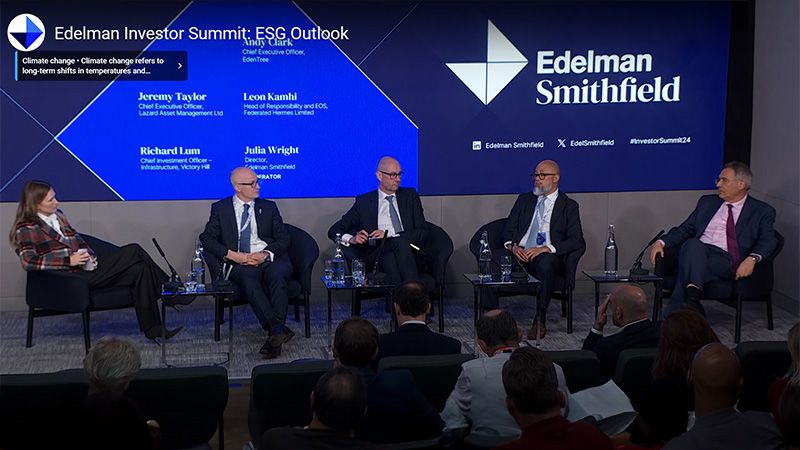Sustainability has entered a new phase described as ‘sustainability 2.0′ which will allow investors to have a “greater influence” on engagement and company value, panellists at the ESG panel of the Edelman Smithfield Investment Summit suggested.
During the panel titled – ESG Outlook: Have we passed ‘peak sustainable’? – moderator Julia Wright, director at Edelman Smithfield, kicked off by describing the “turbulent” journey of ESG, from the growing scrutiny, accusations of greenwashing, terminology debates, and politics which have led to what investors are increasingly calling the “demise of ESG.”
Wright asked the panellists if ESG has become unpopular in light of these issues, however, the resounding message from the panel was that sustainability remains a key priority for investment firms.
The panelists were:
- Jeremy Taylor, chief executive of Lazard Asset Management
- Leon Kamhi, head of responsibility and EOS at Federated Hermes
- Andy Clark, chief executive of EdenTree
- Richard Lum, chief investment officer – infrastructure at Victory Hill.
Taylor acknowledged sustainability has changed over the past decade, entering a new phase from what he labelled “sustainability 1.0” to “sustainability 2.0.” He suggested ESG investment strategies have developed from figuring how to measure credentials, to engaging with companies to align with net-zero targets.
He explained: “Sustainability 1.0 was about reducing carbon emissions, working out how to measure carbon emissions and a range of products became available on the market place, which were passive products with a reduction in carbon emissions.
“Whilst, investments around the energy transition 2.0 is more about engagement and ensuring the companies we are invested in are managing their operations correctly and their returns on capital are positively exposed to these sustainability themes.
“From a flow perspective, we have seen across Europe some large multi-decade investors put billions of dollars to work during this year which will be implemented next year.”
The other panellists agreed with this suggestion, as Clark said: “This year, the UN’s Financing for Sustainable Development report estimates the world faces a $4.2trn (£3.3trn) annual financing gap to achieve sustainable development.
“Over the last decade, there have been products come onto the market that are purely sustainable, whether it is bonds, equities, infrastructure, private or public. This is a developing position: if you look at the narrative of anti-ESG and look at the facts, sustainability has certainly not passed its peak.”
Lum added to this, and said “there will be a lot more influence in the next phase, for example, the opportunity to increase the capacity of capital into proven technologies.”
Sustainability in emerging markets
Whilst, Lum explained “in sustainability 2.0, there needs to be more directional capital going in different geographies to support the transition.”
Lazard AM has a dedicated emerging markets franchise, and Wright asked Taylor how the firm considers sustainability and the energy transition in emerging markets.
Whilst, Taylor explained while there has been major investments in cities in emerging markets, such as Delhi, India, other regions in this country still don’t consider climate in the way large cities do.
He commented on the measurement of emerging markets: “The majority of carbon budgets should be spent in emerging markets. This is because where emerging markets are in their development cycle is more carbon-intensive. You cannot measure a developed market portfolio and emerging market portfolio in the same way, but you must shift your carbon budget.”
Do not let regulation drive asset manager decisions
When asked if regulatory efforts are hindering or accelerating efforts to invest in the context of climate change, Clark spoke about greenhushing and why investors are stepping back from labelling in the UK under the Sustainable Finance Disclosure Regulation (SFDR).
He said: “Greenhushing has become very real, which is not great. It is better to have a larger capital flow, however, many smaller firms feel they cannot commit to labels. There is a balance between regulation encouraging greenhushing because many investors are scared of the backlash of pushing forward ESG packages, and the fact regulation helps in this space.
Whilst, Kamhi said the regulations which are “prescriptive and encourage disclosure for disclosure sake are problems, such as regulations that push labelling. It raises the question of how companies are going to decide on their own what might be impactful on the environment and society.
“In Europe, there is a real risk of doing regulation for regulation’s sake. We are going to end up measuring what is not being done, rather than what needs to be done to transition. We need regulation to push us towards real-world outcomes.”
Whilst, Taylor concluded asset managers must be cautious not to let regulations drive investment decisions. He said: “There has been a fear through this process that ratings from third party providers create a list of companies that they should invest in. This will drive us in the wrong direction: we need to make sure we are making the right investment decisions and they are reflected in the title of the fund or the product we are providing.”
Should ESG as a concept be retired?
Finally, to conclude the panel, Wright revealed in an Edelman Smithfield survey held during the summit, 54% of global investors agreed that the term ESG will not be widely used in three years. Further, 71% of respondents said they would change their investment strategy in line with this changing sentiment.
Taylor said that despite these figures, Lazard will not change its investment strategy because “what remains important is investors maintaining their integrity. Regulations and terms should not drive investment decisions, but what is a priority is putting clients capital to work where they can generate good returns.”
Whilst, Clark suggested “ESG should not be retired because the concept still remains useful, yet, it has been politicised. ESG and sustainable investing are two different things. In an ESG index fund, tobacco could be its biggest holding because ESG scores highly for tobacco companies, which is confusing when a client wishes to invest sustainably.
“We have to do better as an industry of explaining what sustainable, ethical and responsible mean.”








